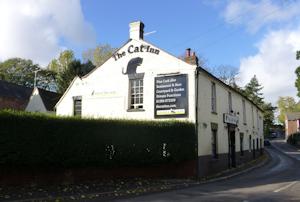The Blacksmith’s Ghost
Around the year 1710 a man named Solomon Fenner lived in the village of Laceby, where he worked as the local blacksmith. Although highly skilled and successful at his work, he was not a rich man, though nor did he live in poverty. Some years before he had served in the army of King William and Queen Mary on the continent, before returning to his native Lincolnshire to take up the trade to which he had been apprenticed in his youth. He was also known in the surrounding area as a rather pious man who attended church each Sunday and gave what little he could afford to give towards the upkeep of the parish poor.
Solomon never married, but he became enraptured by the charms of beautiful Rebecca Petitt, a young woman who lived in the market town of Caistor. Rebecca had long red hair and lovely green eyes and was said to be as kind and witty as she was good looking. Many men showed themselves as suitors but Rebecca’s father, William Petitt, a greedy man who owned land and several shops in Caistor, determined to make his daughter a marriage a match which would be financially advantageous to him.
One day, Solomon Fenner walked the country road to Caistor and showed himself at the Petitts’ home, asking William for his daughter’s hand in marriage. William Petitt, furious that a humble blacksmith should seek to become his son-in-law, angrily denied Solomon and threw him out into the street. Something inside the usually gentle and pious blacksmith snapped.
William Petitt was known to be a man of habit, and every Saturday afternoon he would ride to the hamlet of Cabourne, between Caistor and Laceby, to visit a farmer friend. There he would form part of a group who would drink and gamble late into the night before heading home, drunk, along the same dark Lincolnshire road. The next Saturday night, the vengeful Solomon Fenner was waiting in the shadows along the way. When he saw the drunk and helpless Petitt coming, he leapt at him and bludgeoned him to death with him hammer.
When the red mist cleared and Fenner realised what he had done he was filled with instant remorse. He ran to the nearest farmhouse where he woke the inhabitants and tearfully confessed what he had done. He was detained and help from Caistor was sent for. When the bloody and battered body of William Petitt was discovered there was no doubt that Fenner was speaking the truth.
Solomon Fenner was hanged. Before his death he wept bitterly, cursing his actions that night and expressing fear for his immortal soul. His body was gibbeted on a hill near Cabourne overlooking the scene on his crime. If legend is anything to go by, Solomon Fenner has still not found rest.
According to local folklore, travellers walking between Cabourne and Caistor late at night will be approached by a tall and robust looking man stepping out of the shadows to confront them. His clothes are dirty and he carries a blood-stained hammer in his hand. His eyes are red from weeping. He tells the traveller not to be afraid and that he will not harm them. He then recounts the story of his crime and tells them to remember that all human life is sacred. His punishment for forgetting this and taking a life is to spend eternity telling others of his crime.




Recent Comments